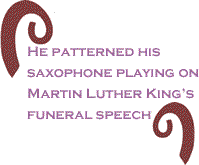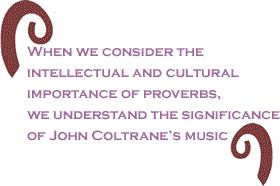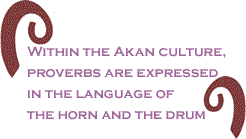| |
|
|
|
|
| |
By
now many of you are aware of my deeply rooted interest in the
life, music and metaphysics of musician John William Coltrane.
On the dawn of his 82nd birthday (9/23) I figured it would be
an appropriate time to share some things I have discovered in
my research about this incredible master composer and musician.
I know so many of us appreciate his music; it is constantly
discussed. However, what is seldom discussed is Coltrane’s life
and beliefs, and how they informed the production and outputs
of this spirit- moving music that uplifts, inspires and motivates
us. Coltrane’s music, much like the proverbs and folklore of the
Akan, tells the collective wisdom and experiences of a people.
Coltrane, within his music, intended to retain the African aesthetic
of art with a purpose. His purpose, as he stated, was to be a
“force for real good,” in other words, to use his gift from the
Creator to help others. What follows is a look at how John Coltrane,
within his music production, retains the African culture of proverbs
and folklore.

 Proverbs
represent the accumulated wisdom and experiences of past generations,
and they constitute an authentic mirror of the mind and philosophy
of a people. Generally, proverbs are primarily told through spoken
word. Within the Akan culture, however, proverbs are expressed
in the language of the horn and the drum. The music of John Coltrane
is filled with proverbial expressions of the Akan people. In particular,
two of his songs, Alabama Proverbs
represent the accumulated wisdom and experiences of past generations,
and they constitute an authentic mirror of the mind and philosophy
of a people. Generally, proverbs are primarily told through spoken
word. Within the Akan culture, however, proverbs are expressed
in the language of the horn and the drum. The music of John Coltrane
is filled with proverbial expressions of the Akan people. In particular,
two of his songs, Alabama (1963) and A
Love Supreme
(1963) and A
Love Supreme (1964) demonstrate not only this continuance of the African
cultural narrative of proverbs, but also the collective wisdom
and experiences of a people. Coltrane’s 1963 recording Alabama
(1964) demonstrate not only this continuance of the African
cultural narrative of proverbs, but also the collective wisdom
and experiences of a people. Coltrane’s 1963 recording Alabama details the collective experience of a people while his 1964 recording
A
Love Supreme
details the collective experience of a people while his 1964 recording
A
Love Supreme features his spiritual connection to previous generations.
features his spiritual connection to previous generations.
 One
of the major impetuses that influenced the rise of the Movement
was the murder of the four young black girls, aged between 11
and 14, on the Sunday morning of September 15, 1963. A dozen sticks
of dynamite were planted by white racists in the basement of the
16th Street Baptist Church in Birmingham,
Alabama. At 10.45 am, the bomb went off, killing the four young girls.
Coltrane wrote Alabama One
of the major impetuses that influenced the rise of the Movement
was the murder of the four young black girls, aged between 11
and 14, on the Sunday morning of September 15, 1963. A dozen sticks
of dynamite were planted by white racists in the basement of the
16th Street Baptist Church in Birmingham,
Alabama. At 10.45 am, the bomb went off, killing the four young girls.
Coltrane wrote Alabama in response to the bombing. He patterned his saxophone playing
on Martin Luther King’s funeral speech. Midway through the song,
mirroring the point where King transforms his mourning into a
statement of renewed determination for the struggle against racism,
Elvin Jones’s drumming rises from a whisper to a pounding rage.
Coltrane’s crescendo signifies the rising of the civil rights
movement from a few Southern voices in outrage to a collective
of voices throughout the U.S.
in response to the bombing. He patterned his saxophone playing
on Martin Luther King’s funeral speech. Midway through the song,
mirroring the point where King transforms his mourning into a
statement of renewed determination for the struggle against racism,
Elvin Jones’s drumming rises from a whisper to a pounding rage.
Coltrane’s crescendo signifies the rising of the civil rights
movement from a few Southern voices in outrage to a collective
of voices throughout the U.S.

Coltrane’s
recording of A
Love Supreme highlights the spiritual connections and continuance of the
collective wisdom of previous generations. What Coltrane did in A
Love Supreme
highlights the spiritual connections and continuance of the
collective wisdom of previous generations. What Coltrane did in A
Love Supreme is similar to the Akan’s use of proverbs to express the collective
wisdom and experiences of a people. For Coltrane, the goal of a musician is to understand the forces behind Akan proverbs.
“I would like to bring to people something like happiness. I would
like to discover a method so that if I want it to rain, it will
start right away to rain.” Coltrane attributes his own “spiritual
awakening” to the understanding of Akan proverbs:
is similar to the Akan’s use of proverbs to express the collective
wisdom and experiences of a people. For Coltrane, the goal of a musician is to understand the forces behind Akan proverbs.
“I would like to bring to people something like happiness. I would
like to discover a method so that if I want it to rain, it will
start right away to rain.” Coltrane attributes his own “spiritual
awakening” to the understanding of Akan proverbs:
“During
the year of 1957, I experienced by the grace of God, a spiritual
awakening which was to lend me to a richer, fuller, more productive
life. At that time, in gratitude, I humbly asked to be given the
means and privilege to make other happy through music. I feel
this has to been granted through His grace. ALL PRAISE TO GOD.”
When we
consider the intellectual and cultural importance of proverbs,
we understand the significance of John Coltrane’s music.  His
music continues the legacy of transmitting collective wisdom and
experiences of a people. A well-informed person will understand
the meaning and translation of the proverbs found in the music
of John Coltrane. His
music continues the legacy of transmitting collective wisdom and
experiences of a people. A well-informed person will understand
the meaning and translation of the proverbs found in the music
of John Coltrane.

BlackCommentator.com
Guest Commentator, Anyabwile Love, is a life-long Philadelphia resident. He is currently a Graduate student at Temple
University in the African American Studies
Department. His primary areas of research include: African cultural
retentions throughout the Diaspora, African aesthetics, ethnomusicology,
jazz musician John Coltrane, Akan proverbs, and the Ki-Kongo cosmograph
cosmology. Anyabwile is the father of ten-year-old Maia Love.
Currently he is the Director of Harcum
College’s Upward Bound program. Click
here to
contact Mr. Love.
|
|
|
|
|
Any BlackCommentator.com article may
be re-printed so long as it is re-printed in its entirety and full
credit given to the author and www.BlackCommentator.com. If the
re-print is on the Internet we additionally request a link back
to the original piece on our Website.
Your comments are always welcome.
If you send us an eMail message
we may publish all or part of it, unless you tell us it
is not for publication. You may also request that we withhold
your name.
Thank you very much for your readership.
|
|
| |

Your comments are always welcome.

|
|
September 25, 2008
Issue 292 |
 is
published every Thursday
is
published every Thursday
|
Executive Editor:
Bill Fletcher, Jr. |
Managing Editor:
Nancy Littlefield |
Publisher:
Peter Gamble |
| Est. April 5, 2002 |
Printer Friendly Version
in resizeable plain
text format or pdf
format. |
|
|
|
| Frequently
Asked Questions |
|
|
|
|
|
|
|
|
| |
 |
 |
|
 |
| |
| |
|
|
|
|
|
| |
| |
|






































 Proverbs
represent the accumulated wisdom and experiences of past generations,
and they constitute an authentic mirror of the mind and philosophy
of a people. Generally, proverbs are primarily told through spoken
word. Within the Akan culture, however, proverbs are expressed
in the language of the horn and the drum. The music of John Coltrane
is filled with proverbial expressions of the Akan people. In particular,
two of his songs,
Proverbs
represent the accumulated wisdom and experiences of past generations,
and they constitute an authentic mirror of the mind and philosophy
of a people. Generally, proverbs are primarily told through spoken
word. Within the Akan culture, however, proverbs are expressed
in the language of the horn and the drum. The music of John Coltrane
is filled with proverbial expressions of the Akan people. In particular,
two of his songs,  One
of the major impetuses that influenced the rise of the Movement
was the murder of the four young black girls, aged between 11
and 14, on the Sunday morning of September 15, 1963. A dozen sticks
of dynamite were planted by white racists in the basement of the
One
of the major impetuses that influenced the rise of the Movement
was the murder of the four young black girls, aged between 11
and 14, on the Sunday morning of September 15, 1963. A dozen sticks
of dynamite were planted by white racists in the basement of the






